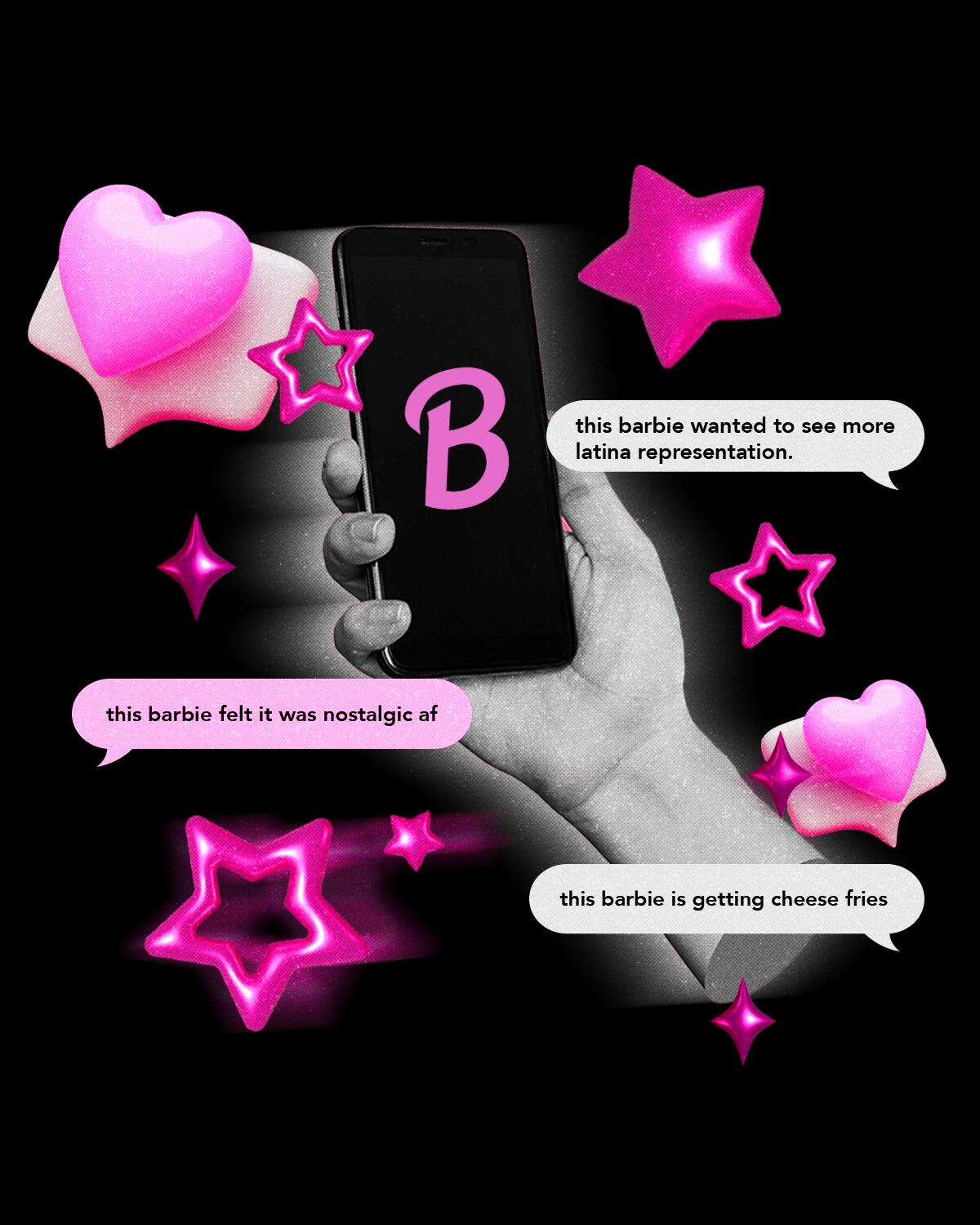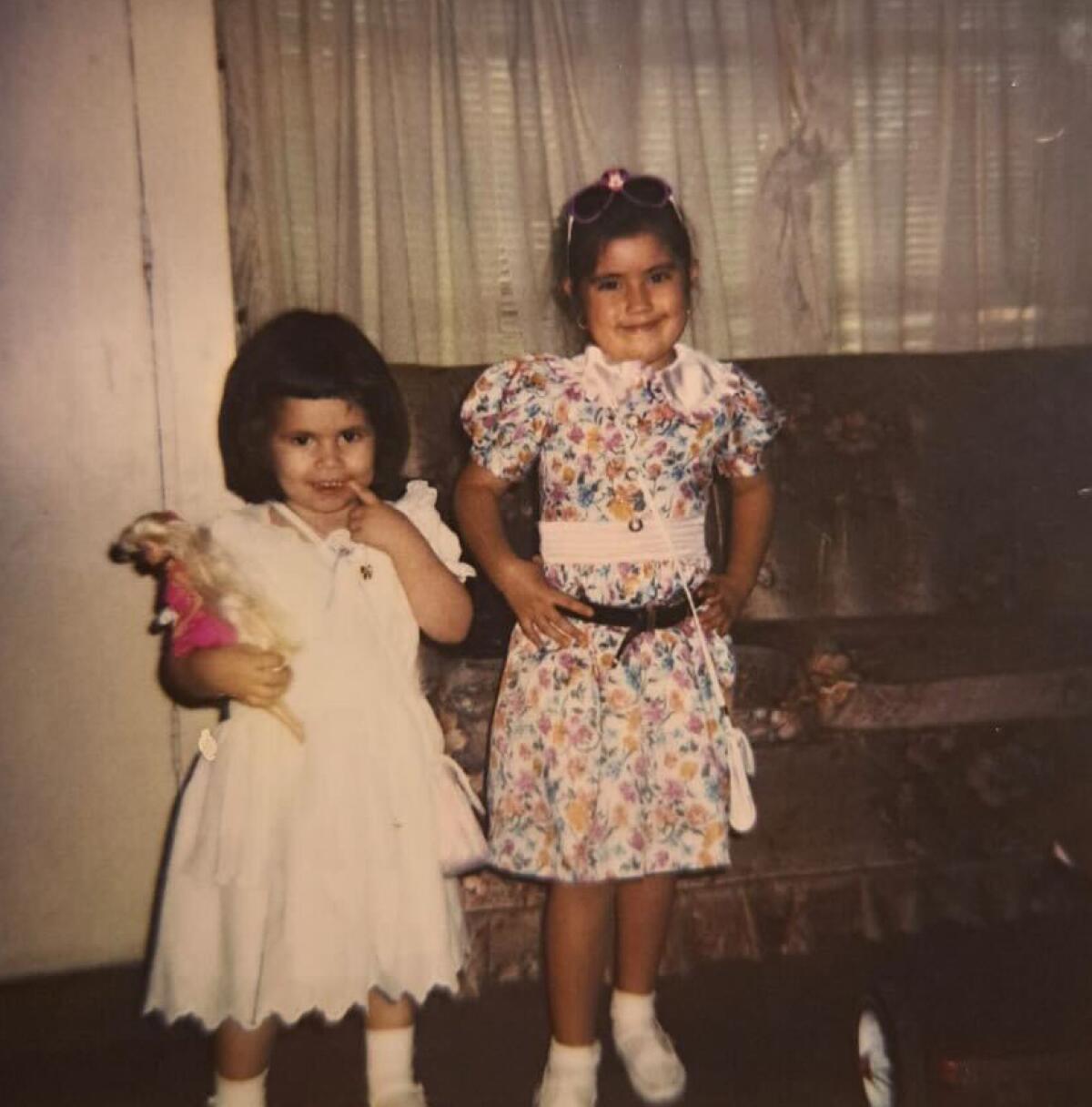Latinx Files: A roundtable discussion on Latinidad in ‘Barbie’

- Share via
Like many of you, I too went to the theater this weekend to watch “Barbie.” My initial plan was to write about the movie for the newsletter, but eventually decided that “man writes take about ‘Barbie’” was not the way to go. Instead, I asked several of my Latina colleagues to partake in a roundtable discussion about the film and the Latinx representation in it.
Fidel: I’ll kick things off with the sentiment expressed in this tweet. I should preface this by saying that I enjoyed the movie immensely, but couldn’t help but think of how the only Latinx characters in the film are essentially Barbie consumers. I know it’s a somewhat cynical take, but I couldn’t help myself.
I recognize that this is a very “man” take to have. I didn’t grow up with Barbies, so I don’t have that emotional attachment to the toy. I am also willing to acknowledge that your personal essay, Elvia, about your own Barbie connection/collection softened me up a bit. I really loved it, and I think the part that struck me was how much Barbie was pivotal to the formation of the American part of your Mexican American identity.
Suzy Exposito (De Los cultural columnist): Elvia should get the first word here, but... I did not grow up playing with Barbies. Even as a kid I found them alienating, given that I was brown with jet black hair. Family members tried to gift them to my sister and I — at some point I did get a Pocahontas Barbie I liked! — but we played out our juicy telenovelas using Beanie Babies instead. We’d take the clothes from Barbies and squeeze the Beanie Babies into their dresses. A psychoanalyst would probably have a field day with us.
Elvia Limón (newsletter editor): Fidel, it is an honor and a privilege to have made you soften up to Barbie. My work here is done, and I will now be clocking out for the rest of the week. (If my boss is reading this, I’m kidding.)
I agree with your sentiment. I truly wish there would’ve been a Latina in Barbie Land. I expected Barbie’s first Latina friend, Teresa Rivera, to make a cameo. I had a few Teresa dolls as a girl (shout out to Butterfly Princess Teresa, one of my faves). But the movie’s message and relatability were strong enough for me to give them a pass.
It was also lovely to see two Latinas without stereotypes have leading roles in a blockbuster movie.
S.E.: I did wonder why there was no Latina Barbie. Teresa is canonically Latina. Perhaps they figured their bases were covered with the humans (America Ferrera and Ariana Greenblatt)?
E.L.: Perhaps? I was bummed that Teresa and Christie weren’t part of it but Midge, the pregnant one, and Skipper, Barbie’s sister, were. Side note: I had the pooping dog and Midge growing up, so it was fun getting to see those toys in real life. I completely forgot about the dog until Saturday, when I saw the movie.
F.M.: That was something that really stuck with me. In the film, Barbie Land is this matriarchal feminist utopia where every race and ethnicity is represented ... except Latinas.
Martina Ibañez-Baldor (deputy design director, De Los): I was hoping to see Teresa in Barbie Land too! Would have been cool to have America Ferrera have some kind of memory of Teresa. It’s also interesting how race is never mentioned in the movie. Wait till Barbie learns about racial injustice in the real world. She’s going to get even more depressed lol!
I loved having dolls that looked like me as a kid, like Teresa. And I was OBSESSED with the Josefina American Girl Doll, read all her books.
E.L.: I also noticed that race wasn’t mentioned in the movie, but I guess you can only do so much within two hours. I can see why they took a more general look into the patriarchy. To me, the purpose of the movie was relatable to people who struggle in our patriarchal society while being digestible to those who benefit from it. It is more of a conversation starter and a piece of the discussion. It’s not the full puzzle.
The Latinx experience chronicled
Get the Latinx Files newsletter for stories that capture the multitudes within our communities.
You may occasionally receive promotional content from the Los Angeles Times.
F.M.: SPOILER ALERT! How do we feel about the “Si se puede!” gag?
Susana Sanchez (art director): I laughed out loud when the daughter quickly shut her dad down.
M.I.B.: Definitely was an eye-roll for me.
F.M.: Elvia, do you have any photos of your collection?
E.L.: I’m not sure. Gonna ask my mom real quick. It’s funny because all of the dolls are still in my parents garage but I don’t know if I ever took pics with them. I was too busy playing, I guess.
My mom found one of 4 year old me. But I think that’s as much as we have. lol

F.M.: Scheming at such an early age. Love to see it!
S.S.: My son, who is 12, and my daughter, who is 10, enjoyed the movie and both asked a million questions about society and how men treat women and the patriarchy.
It didn’t bother me that Latina Barbies were not highlighted. Seeing America Ferrera as a second leading lady made me giddy. I told my kids she’s Central Americana like me. That’s a win.
S.E.: I really resonated with Sasha, the tween. By 13 I was already buried in riot grrrl records and feminist lit — despite growing up in a Catholic, conservative household, muahaha — and I resented how giddy this movie made me, seeing as it’s two-hour Barbie commercial! But the scenes with Gloria and Sasha made me miss my mom. We used to drive around singing Indigo Girls too.
I really loved when Barbie and the Ghost of Ruth Handler share this strange liminal space between worlds. And Ruth cues this montage of memories, full of girls and women laughing and enjoying themselves at all ages. It made me feel so lucky to see the women in my family grow old. Even if they don’t feel as beautiful as they did when they were young, it’s a blessing to share all these years with them. I think about how Western, white beauty standards program us to see shame in places where we should see strength and survival.
E.L.: I’m not a mother, but the line, “We mothers stand still so our daughters can look back to see how far they have come,” destroyed me. I thought of my mother, who could only attend school until the sixth grade because she had to stay home and help care for her siblings, and how much she pushed for me to have an education. She has done so much to help me move forward.
I also thought about the women who have pushed against machismo and conventional gender roles so that I can now peacefully enjoy being a single cat lady in my 30s. That’s not something my mother or my grandmother would’ve been able to do.
Being reminded of that progress also made me sad because I wish the women before me would’ve had that same opportunity. Brb gonna cry about this again. JK.
S.S.: I didn’t know I would cry, not once but twice!
Consider subscribing to the Los Angeles Times
Your support helps us deliver the news that matters most. Become a subscriber.
M.I.B.: I might be more cynical—I’d heard there was going to be this “bigger message” and the montage of real women. I was expecting more. I was ready to cry but didn’t come close. I found it all just cheesy. But I suppose for little girls watching it, the message is important and will be heard.
But Barbie getting gassed up to go see the gynecologist was pretty funny and relatable lol. I wish my mami could still go with me to my gyno appointments.
S.E.: My only interjection to the mother line is: I don’t think our moms will ever be done growing and learning about themselves! At least I would hope not! Moms are people too.
But I also think the point stands that we should all want better for those who come after us.
F.M.: I’m just going to drop this story that may or may not reinforce my cynicism here.
I do think there is something to be said about the role that capitalism plays here. Suzy, you previously mentioned to me this idea that being bicultural—as we all are—means that you have to actively buy the American side of your Latinx American identity. Can you expound a little more on that, or am I mischaracterizing what you said?
S.E.: Well, yeah. We’re made to earn our cultural citizenship in the U.S. by consuming. By this neoliberal framework, representation in the market — or being marketed to — is supposed to give the sense that we’re active participants in democracy.
As much as we have the right to be disappointed when we’re exploited, ignored and rendered invisible in media, we should also question how much power representation actually holds. For all the victories that come with a movie like Barbie — which achieved the highest-grossing first weekend for a film directed by a woman — it’s important to note that women comprise many of the TV and film workers on strike for better wages and protections.
F.M.: Any parting thoughts about “Barbie” before I close this chat up? Here are mine: Having this conversation has been instructive and has tempered some of my cynicism—we are ascribing a lot of meaning to a film that’s basically a long commercial for a toy line. Some of that is still there and I think it’s because Barbies hold very little meaning to me. That said, I’m sure when “Blue Beetle” comes out in a few weeks, the shoe will most likely be on the other foot.
M.I.B.: Still think it would have been cool to have a Latino in Barbie World. I was looking forward to seeing Teresa! But I’m glad there was a least some representation in the movie. And I’m still team American Girl dolls jeje
S.E.: I loved American Girl dolls because they came with books! I could only afford the books, though. I think it’s overall a net good that people are prompted to think critically about gender relations through a film as fun and colorful as this one.
S.S.: Just wanted to add that I grew up cleaning houses with my mom, tías and abuelita. I’d sometimes see the most epic toy rooms in these big houses and always wished for a Barbie. One Christmas, my tía Alba gifted me a Barbie— the Day-to-Night Barbie. Pink suit and reversable pink skirt. The movie reminded me of my family’s humble beginnings, in a weird way!
M.I.B.: I asked my mom about Barbies fwiw:
“Yeah, I love American Girl dolls! They are more real, classic, more cultural and more relatable. But they were very expensive so out of reach for many. Barbies are very American cheap, shiny plastic things. Even with all the efforts at multicultural and professional dolls, they were still trying to sell something. Of course the products but also an ideal of beauty. I want to see the movie though!”
E.L.: My last thought is that I enjoyed the movie. It was funny to see misogynists get upset. I saw that Mattel is going to do movies for many of their other toys after Barbie’s success. I’m curious to see if those will hold up as well as this one. I also hope they never make a Barbie sequel. Just leave it alone, I beg.
The Latinx experience chronicled
Get the Latinx Files newsletter for stories that capture the multitudes within our communities.
You may occasionally receive promotional content from the Los Angeles Times.








